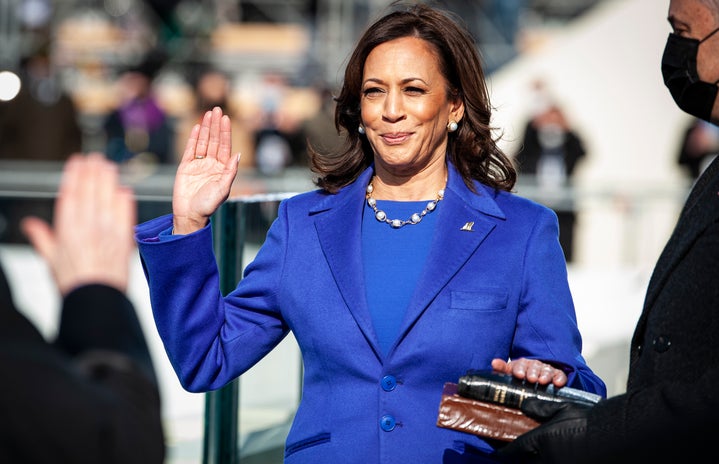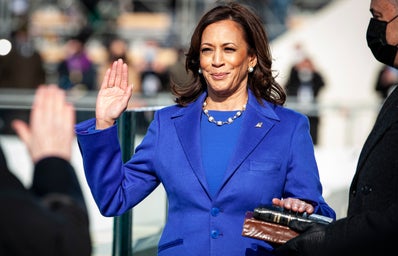Current conversations around newly inaugurated Madame Vice President Kamala Harris seem to take two very polar opposite approaches.
While her nomination and later victory has been praised by many for being the first female Vice President of the United States, the first African American Vice President, and the first Asian American Vice President. Yet, many are quick to note her controversial past, leading them to be less keen on her inauguration. As district attorney general of San Francisco and attorney general for the state of California, she has been infamous for controversial criminal justice policies, specifically for maintaining a “tough on crime” stance that many feel had unfair implications for minority groups that are already targeted by the justice system.
I am the first to say that we should be critical of any and all politicians, even those who represent triumphs for the underrepresented. And it is without a doubt that the new vice-president will have her fair share of well-deserved scrutiny as society continues to look for change after the racial reckoning we saw with the murder of George Floyd and the resurgence of BLM.
And yet, I, a skeptic at heart, cannot help but feel as though the current political moment marks an inspiring change for women of colour in the sphere of politics.
As someone who is in her first year of university and is a projected Political Studies major, it would be naive and unfair to say that Kamala Harris’ achievement has not been a beacon of hope. Personally, the simple fact that we can now discuss American politics and not be listing white man after white man means a change of tone in my classrooms.
Politics, and all its intersections, is assumed to be a field of inclusivity. Of course, you are often discussing topics that require a variety of opinions. And yet, women of colour are still underrepresented in politics and government. Despite a history proving both women and people of colour to be incredibly crucial demographics in elections, in Canada, approx 29 percent of seats filled by women in the House of Commons. On top of that, the House of Commons currently sees approx 17.8 percent of its seats filled by a visible minority. Regardless of the great achievements towards better representation in government, the world of politics remains to be overwhelmingly male and white.
So, for obvious reasons, Harris’s triumph may inspire tons of young women of colour to enter the sphere of politics. The importance of representation is not lost on most people. But it will also remind the girls already started on this journey that they deserve to be there too.
As I sat in my sister’s living room watching the debate between then-Vice President Pence and Harris and watched the now-memorable moment when she swiftly reminded Pence that she was “talking”, I couldn’t help feeling a rush of adrenaline. To see a woman fight against the microaggressions so many of us experience in academic environments was not only inspiring (and, in all honesty, humorous, as the memes followed were enjoyable) but relatable. I love politics, but I had only felt a similar feeling of acceptance and belonging when a record number of women of colour were elected to congress in 2018 (truly, I felt what can only be described as a confidence boost when Alexandria Ocasio Cortez and Rashida Tlaib were sworn in).

I think back to a moment in my senior year politics class. It was a polarizing environment, where heated arguments were a daily occurrence. Our teacher constantly reminded us to stay friendly and respectful, but it was very clear that conversations quickly turned uncomfortable, especially for the women and people of colour in the room who had to hear very strong opinions on Trump, abortion, and refugee laws. During a debate, I discussed why it is so important to have a strong welfare system, going into my family’s history of being welfare recipients as new refugees, when I noticed a male classmate laughing.
By some strange force within me, partly offended, partly humiliated, I asked him if he had anything he’d like to say instead of just laughing at me from a corner. This resulted in more laughter and the conversation quickly changed topics. My friends were proud that I stood up for myself, and yet all I felt for the rest of the day was regret.
And I realized that while I stood up for myself, my shame did not stem from being laughed at, but from fear that my peers would see me as sensitive. And that, in turn, would make me stick out even more. And while my close friends laughed and patted my back after hearing the story, I still felt embarrassed for my reaction – I felt like I had taken it too far. The oh-so debilitating impact of imposter syndrome, especially as one of the few people of colour in the class, was suddenly so apparent to me.
For people who already stand out as outsiders in academic environments, we have to try twice as hard to not be controversial. To hold our tongue, to not speak with too much emotion as god forbid we be pegged as hormonal women. There’s an overwhelming amount of pressure that often results in us shrinking ourselves into agreeable, easy-to-swallow, personas.
Yet watching Harris’ polite, but razor-sharp, response to Pence reminded me that I should not be ashamed of taking up space in my politics class. That I have just as much of a reason to be in the room and participate in these conversations. It reminded me that representation is not only important for inspirational purposes but for tackling the feelings of isolation that so many people of colour feel in academic settings. As I head into completing my first year of university, and Harris embarks on her first year as Vice President, I emerge feeling hopeful that the often homogenous landscape of politics will feel less isolating and intimidating for students of colour. At least we know that we can make it to the other side and be just as successful as our white colleagues.
As complicated as it feels, Harris’s triumph may inspire tons of young women of colour to enter the sphere of politics. And it will also remind the girls already started on this journey that they deserve to be there too.

I’m not going to sit here and argue that Ms. Harris is a perfect politician. I won’t even say she’s my idea of a perfect politician. There is no doubt she has a difficult job ahead of her to gain the trust of her skeptics. But, if I’m being completely honest, watching her get sworn into office made me feel like I do have a right to take up space in my classes. And that if I speak up during a debate, well, at least I know that you can be both bold, a woman of colour, and a successful politician, all at once.
And for that, I guess I have to say thank you, Madam Vice President.




